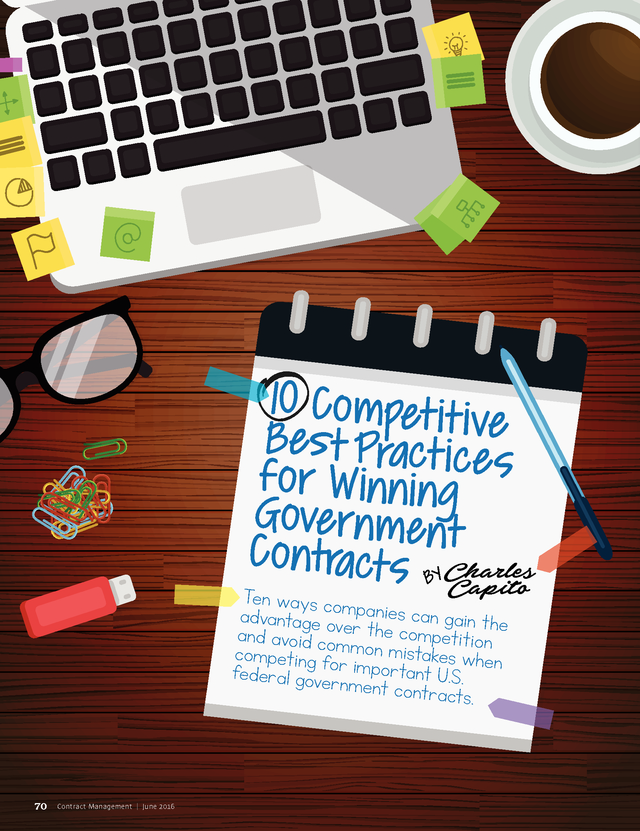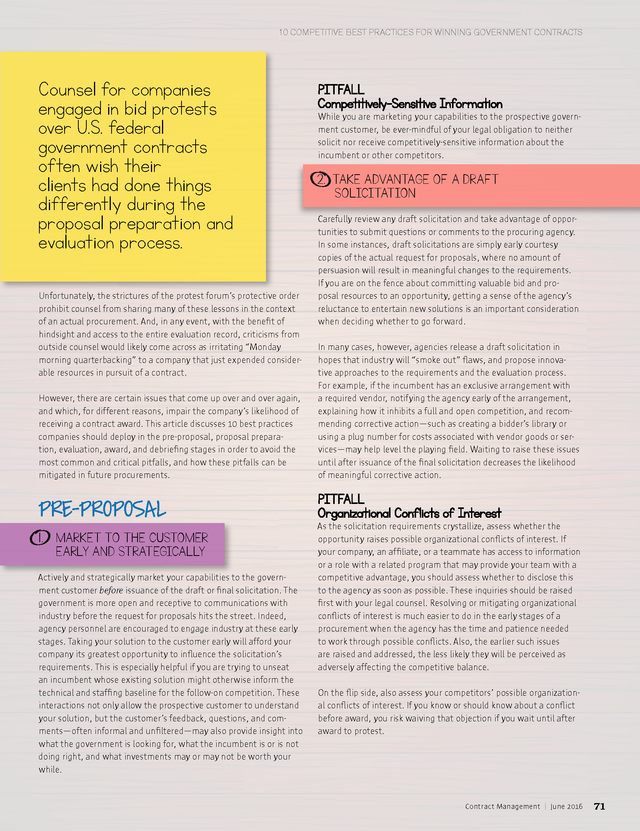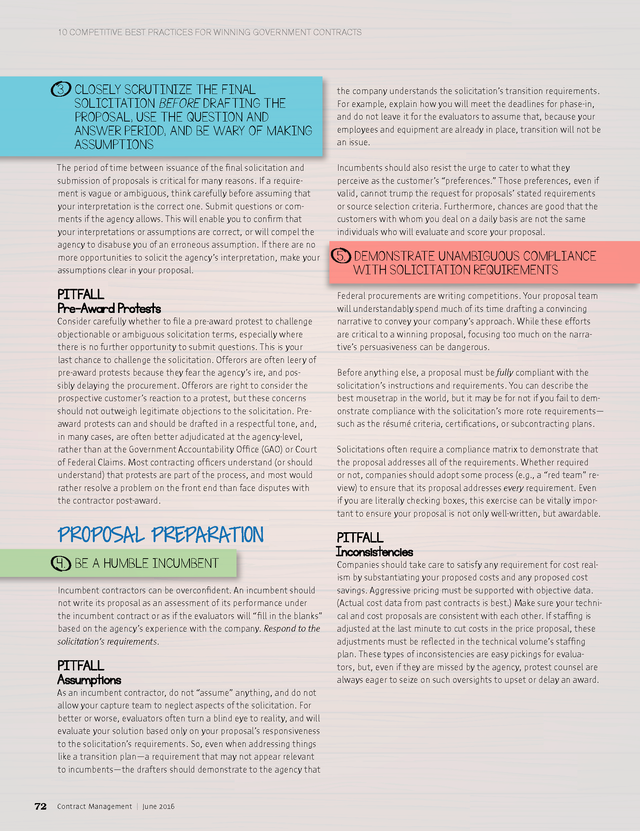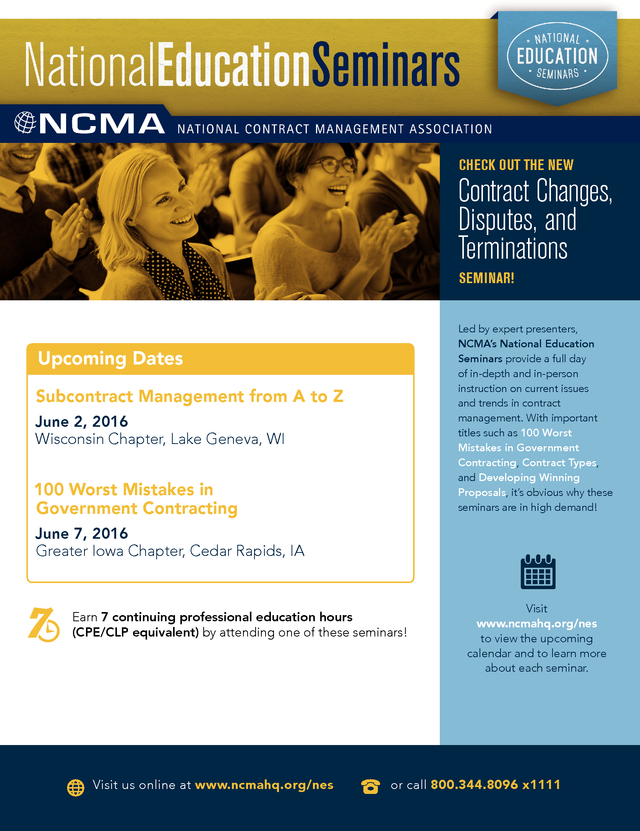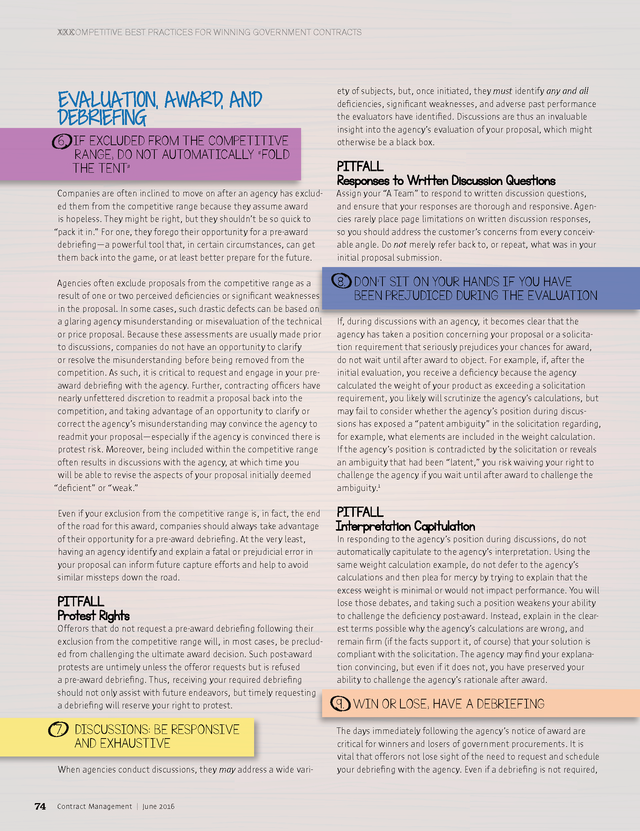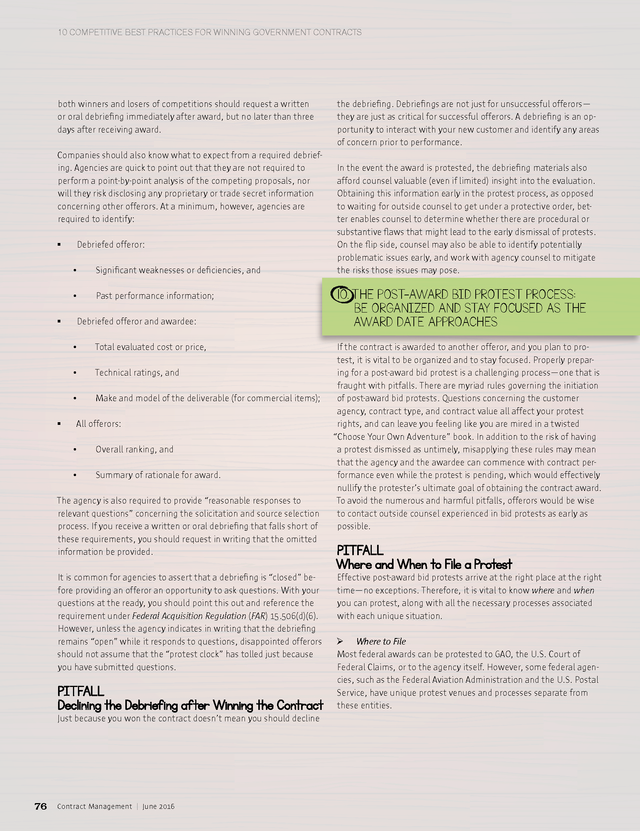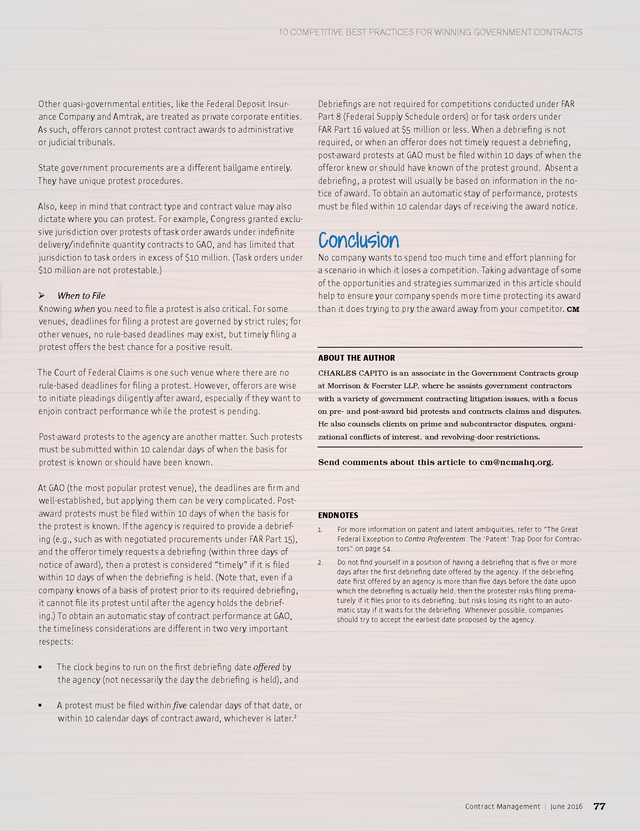Description
1 0 Competitive
Bes t Practic es
f or W inning
Government
Contracts BYCharles
Capito
Ten ways com
advantage overpanies can gain the
and avoid comm the competition
competing for on mistakes when
federal govern important U.S.
ment contract
s.
70
Contract Management | June 2016
. 10 COMPETITIVE BEST PRACTICES FOR WINNING GOVERNMENT CONTRACTS
Counsel for companies
engaged in bid protests
over U.S. federal
government contracts
often wish their
clients had done things
differently during the
proposal preparation and
evaluation process.
Unfortunately, the strictures of the protest forum’s protective order
prohibit counsel from sharing many of these lessons in the context
of an actual procurement. And, in any event, with the benefit of
hindsight and access to the entire evaluation record, criticisms from
outside counsel would likely come across as irritating “Monday
morning quarterbacking” to a company that just expended considerable resources in pursuit of a contract.
PITFALL
Competitively-Sensitive Information
While you are marketing your capabilities to the prospective government customer, be ever-mindful of your legal obligation to neither
solicit nor receive competitively-sensitive information about the
incumbent or other competitors.
2. TAKE ADVANTAGE OF A DRAFT
SOLICITATION
Carefully review any draft solicitation and take advantage of opportunities to submit questions or comments to the procuring agency.
In some instances, draft solicitations are simply early courtesy
copies of the actual request for proposals, where no amount of
persuasion will result in meaningful changes to the requirements.
If you are on the fence about committing valuable bid and proposal resources to an opportunity, getting a sense of the agency’s
reluctance to entertain new solutions is an important consideration
when deciding whether to go forward.
However, there are certain issues that come up over and over again,
and which, for different reasons, impair the company’s likelihood of
receiving a contract award. This article discusses 10 best practices
companies should deploy in the pre-proposal, proposal preparation, evaluation, award, and debriefing stages in order to avoid the
most common and critical pitfalls, and how these pitfalls can be
mitigated in future procurements.
In many cases, however, agencies release a draft solicitation in
hopes that industry will “smoke out” flaws, and propose innovative approaches to the requirements and the evaluation process.
For example, if the incumbent has an exclusive arrangement with
a required vendor, notifying the agency early of the arrangement,
explaining how it inhibits a full and open competition, and recommending corrective action—such as creating a bidder’s library or
using a plug number for costs associated with vendor goods or services—may help level the playing field.
Waiting to raise these issues until after issuance of the final solicitation decreases the likelihood of meaningful corrective action. PRE-PROPOSAL PITFALL Organizational Conflicts of Interest 1. MARKET TO THE CUSTOMER EARLY AND STRATEGICALLY Actively and strategically market your capabilities to the government customer before issuance of the draft or final solicitation. The government is more open and receptive to communications with industry before the request for proposals hits the street. Indeed, agency personnel are encouraged to engage industry at these early stages.
Taking your solution to the customer early will afford your company its greatest opportunity to influence the solicitation’s requirements. This is especially helpful if you are trying to unseat an incumbent whose existing solution might otherwise inform the technical and staffing baseline for the follow-on competition. These interactions not only allow the prospective customer to understand your solution, but the customer’s feedback, questions, and comments—often informal and unfiltered—may also provide insight into what the government is looking for, what the incumbent is or is not doing right, and what investments may or may not be worth your while. As the solicitation requirements crystallize, assess whether the opportunity raises possible organizational conflicts of interest.
If your company, an affiliate, or a teammate has access to information or a role with a related program that may provide your team with a competitive advantage, you should assess whether to disclose this to the agency as soon as possible. These inquiries should be raised first with your legal counsel. Resolving or mitigating organizational conflicts of interest is much easier to do in the early stages of a procurement when the agency has the time and patience needed to work through possible conflicts.
Also, the earlier such issues are raised and addressed, the less likely they will be perceived as adversely affecting the competitive balance. On the flip side, also assess your competitors’ possible organizational conflicts of interest. If you know or should know about a conflict before award, you risk waiving that objection if you wait until after award to protest. Contract Management | June 2016 71 . 10 COMPETITIVE BEST PRACTICES FOR WINNING GOVERNMENT CONTRACTS 3. CLOSELY SCRUTINIZE THE FINAL SOLICITATION BEFORE DRAFTING THE PROPOSAL, USE THE QUESTION AND ANSWER PERIOD, AND BE WARY OF MAKING ASSUMPTIONS the company understands the solicitation’s transition requirements. For example, explain how you will meet the deadlines for phase-in, and do not leave it for the evaluators to assume that, because your employees and equipment are already in place, transition will not be an issue. The period of time between issuance of the final solicitation and submission of proposals is critical for many reasons. If a requirement is vague or ambiguous, think carefully before assuming that your interpretation is the correct one. Submit questions or comments if the agency allows. This will enable you to confirm that your interpretations or assumptions are correct, or will compel the agency to disabuse you of an erroneous assumption.
If there are no more opportunities to solicit the agency’s interpretation, make your assumptions clear in your proposal. Incumbents should also resist the urge to cater to what they perceive as the customer’s “preferences.” Those preferences, even if valid, cannot trump the request for proposals’ stated requirements or source selection criteria. Furthermore, chances are good that the customers with whom you deal on a daily basis are not the same individuals who will evaluate and score your proposal. PITFALL Pre-Award Protests Federal procurements are writing competitions. Your proposal team will understandably spend much of its time drafting a convincing narrative to convey your company’s approach.
While these efforts are critical to a winning proposal, focusing too much on the narrative’s persuasiveness can be dangerous. Consider carefully whether to file a pre-award protest to challenge objectionable or ambiguous solicitation terms, especially where there is no further opportunity to submit questions. This is your last chance to challenge the solicitation. Offerors are often leery of pre-award protests because they fear the agency’s ire, and possibly delaying the procurement.
Offerors are right to consider the prospective customer’s reaction to a protest, but these concerns should not outweigh legitimate objections to the solicitation. Preaward protests can and should be drafted in a respectful tone, and, in many cases, are often better adjudicated at the agency-level, rather than at the Government Accountability Office (GAO) or Court of Federal Claims. Most contracting officers understand (or should understand) that protests are part of the process, and most would rather resolve a problem on the front end than face disputes with the contractor post-award. PROPOSAL PREPARATION 4. BE A HUMBLE INCUMBENT Incumbent contractors can be overconfident.
An incumbent should not write its proposal as an assessment of its performance under the incumbent contract or as if the evaluators will “fill in the blanks” based on the agency’s experience with the company. Respond to the solicitation’s requirements. PITFALL Assumptions As an incumbent contractor, do not “assume” anything, and do not allow your capture team to neglect aspects of the solicitation. For better or worse, evaluators often turn a blind eye to reality, and will evaluate your solution based only on your proposal’s responsiveness to the solicitation’s requirements.
So, even when addressing things like a transition plan—a requirement that may not appear relevant to incumbents—the drafters should demonstrate to the agency that 72 Contract Management | June 2016 5. DEMONSTRATE UNAMBIGUOUS COMPLIANCE WITH SOLICITATION REQUIREMENTS Before anything else, a proposal must be fully compliant with the solicitation’s instructions and requirements. You can describe the best mousetrap in the world, but it may be for not if you fail to demonstrate compliance with the solicitation’s more rote requirements— such as the résumé criteria, certifications, or subcontracting plans. Solicitations often require a compliance matrix to demonstrate that the proposal addresses all of the requirements. Whether required or not, companies should adopt some process (e.g., a “red team” review) to ensure that its proposal addresses every requirement.
Even if you are literally checking boxes, this exercise can be vitally important to ensure your proposal is not only well-written, but awardable. PITFALL Inconsistencies Companies should take care to satisfy any requirement for cost realism by substantiating your proposed costs and any proposed cost savings. Aggressive pricing must be supported with objective data. (Actual cost data from past contracts is best.) Make sure your technical and cost proposals are consistent with each other. If staffing is adjusted at the last minute to cut costs in the price proposal, these adjustments must be reflected in the technical volume’s staffing plan.
These types of inconsistencies are easy pickings for evaluators, but, even if they are missed by the agency, protest counsel are always eager to seize on such oversights to upset or delay an award. . CHECK OUT THE NEW Contract Changes, Disputes, and Terminations SEMINAR! Led by expert presenters, NCMA’s National Education Seminars provide a full day of in-depth and in-person instruction on current issues and trends in contract management. With important titles such as 100 Worst Mistakes in Government Contracting, Contract Types, and Developing Winning Proposals, it’s obvious why these seminars are in high demand! Upcoming Dates Subcontract Management from A to Z June 2, 2016 Wisconsin Chapter, Lake Geneva, WI 100 Worst Mistakes in Government Contracting June 7, 2016 Greater Iowa Chapter, Cedar Rapids, IA Earn 7 continuing professional education hours (CPE/CLP equivalent) by attending one of these seminars! Visit us online at www.ncmahq.org/nes Visit www.ncmahq.org/nes to view the upcoming calendar and to learn more about each seminar. or call 800.344.8096 x1111 . 10 COMPETITIVE BEST PRACTICES FOR WINNING GOVERNMENT CONTRACTS XXX EVALUATION, AWARD, AND DEBRIEFING 6. IF EXCLUDED FROM THE COMPETITIVE RANGE, DO NOT AUTOMATICALLY “FOLD THE TENT” ety of subjects, but, once initiated, they must identify any and all deficiencies, significant weaknesses, and adverse past performance the evaluators have identified. Discussions are thus an invaluable insight into the agency’s evaluation of your proposal, which might otherwise be a black box. PITFALL Responses to Written Discussion Questions Companies are often inclined to move on after an agency has excluded them from the competitive range because they assume award is hopeless. They might be right, but they shouldn’t be so quick to “pack it in.” For one, they forego their opportunity for a pre-award debriefing—a powerful tool that, in certain circumstances, can get them back into the game, or at least better prepare for the future. Assign your “A Team” to respond to written discussion questions, and ensure that your responses are thorough and responsive. Agencies rarely place page limitations on written discussion responses, so you should address the customer’s concerns from every conceivable angle.
Do not merely refer back to, or repeat, what was in your initial proposal submission. Agencies often exclude proposals from the competitive range as a result of one or two perceived deficiencies or significant weaknesses in the proposal. In some cases, such drastic defects can be based on a glaring agency misunderstanding or misevaluation of the technical or price proposal. Because these assessments are usually made prior to discussions, companies do not have an opportunity to clarify or resolve the misunderstanding before being removed from the competition.
As such, it is critical to request and engage in your preaward debriefing with the agency. Further, contracting officers have nearly unfettered discretion to readmit a proposal back into the competition, and taking advantage of an opportunity to clarify or correct the agency’s misunderstanding may convince the agency to readmit your proposal—especially if the agency is convinced there is protest risk. Moreover, being included within the competitive range often results in discussions with the agency, at which time you will be able to revise the aspects of your proposal initially deemed “deficient” or “weak.” 8. DON’T SIT ON YOUR HANDS IF YOU HAVE BEEN PREJUDICED DURING THE EVALUATION Even if your exclusion from the competitive range is, in fact, the end of the road for this award, companies should always take advantage of their opportunity for a pre-award debriefing.
At the very least, having an agency identify and explain a fatal or prejudicial error in your proposal can inform future capture efforts and help to avoid similar missteps down the road. PITFALL Protest Rights Offerors that do not request a pre-award debriefing following their exclusion from the competitive range will, in most cases, be precluded from challenging the ultimate award decision. Such post-award protests are untimely unless the offeror requests but is refused a pre-award debriefing. Thus, receiving your required debriefing should not only assist with future endeavors, but timely requesting a debriefing will reserve your right to protest. 7. DISCUSSIONS: BE RESPONSIVE AND EXHAUSTIVE When agencies conduct discussions, they may address a wide vari- 74 Contract Management | June 2016 If, during discussions with an agency, it becomes clear that the agency has taken a position concerning your proposal or a solicitation requirement that seriously prejudices your chances for award, do not wait until after award to object.
For example, if, after the initial evaluation, you receive a deficiency because the agency calculated the weight of your product as exceeding a solicitation requirement, you likely will scrutinize the agency’s calculations, but may fail to consider whether the agency’s position during discussions has exposed a “patent ambiguity” in the solicitation regarding, for example, what elements are included in the weight calculation. If the agency’s position is contradicted by the solicitation or reveals an ambiguity that had been “latent,” you risk waiving your right to challenge the agency if you wait until after award to challenge the ambiguity.1 PITFALL Interpretation Capitulation In responding to the agency’s position during discussions, do not automatically capitulate to the agency’s interpretation. Using the same weight calculation example, do not defer to the agency’s calculations and then plea for mercy by trying to explain that the excess weight is minimal or would not impact performance. You will lose those debates, and taking such a position weakens your ability to challenge the deficiency post-award.
Instead, explain in the clearest terms possible why the agency’s calculations are wrong, and remain firm (if the facts support it, of course) that your solution is compliant with the solicitation. The agency may find your explanation convincing, but even if it does not, you have preserved your ability to challenge the agency’s rationale after award. 9. WIN OR LOSE, HAVE A DEBRIEFING The days immediately following the agency’s notice of award are critical for winners and losers of government procurements. It is vital that offerors not lose sight of the need to request and schedule your debriefing with the agency.
Even if a debriefing is not required, . Empower your emerging leader through the Contract Management Leadership Development Program (CMLDP) W ith extensive leadership training and access to high-quality contract management education, the CMLDP is a win-win for both the supervisor and student. This tuition-free program provides both the government and industry perspective, giving your employee the bigger picture and making them a more valuable contributor. Invest in your employees and encourage them to apply. Applications are currently being accepted through June 30, 2016. Program requirements, information, and the application can be found at www.ncmahq.org/cmldp2017. .
10 COMPETITIVE BEST PRACTICES FOR WINNING GOVERNMENT CONTRACTS both winners and losers of competitions should request a written or oral debriefing immediately after award, but no later than three days after receiving award. Companies should also know what to expect from a required debriefing. Agencies are quick to point out that they are not required to perform a point-by-point analysis of the competing proposals, nor will they risk disclosing any proprietary or trade secret information concerning other offerors. At a minimum, however, agencies are required to identify: §§ Debriefed offeror: • • §§ Significant weaknesses or deficiencies, and Past performance information; Debriefed offeror and awardee: • • Technical ratings, and • §§ Total evaluated cost or price, Make and model of the deliverable (for commercial items); All offerors: • Overall ranking, and • Summary of rationale for award. The agency is also required to provide “reasonable responses to relevant questions” concerning the solicitation and source selection process. If you receive a written or oral debriefing that falls short of these requirements, you should request in writing that the omitted information be provided. It is common for agencies to assert that a debriefing is “closed” before providing an offeror an opportunity to ask questions.
With your questions at the ready, you should point this out and reference the requirement under Federal Acquisition Regulation (FAR) 15.506(d)(6). However, unless the agency indicates in writing that the debriefing remains “open” while it responds to questions, disappointed offerors should not assume that the “protest clock” has tolled just because you have submitted questions. PITFALL Declining the Debriefing after Winning the Contract Just because you won the contract doesn’t mean you should decline 76 Contract Management | June 2016 the debriefing. Debriefings are not just for unsuccessful offerors— they are just as critical for successful offerors. A debriefing is an opportunity to interact with your new customer and identify any areas of concern prior to performance. In the event the award is protested, the debriefing materials also afford counsel valuable (even if limited) insight into the evaluation. Obtaining this information early in the protest process, as opposed to waiting for outside counsel to get under a protective order, better enables counsel to determine whether there are procedural or substantive flaws that might lead to the early dismissal of protests. On the flip side, counsel may also be able to identify potentially problematic issues early, and work with agency counsel to mitigate the risks those issues may pose. 10. THE POST-AWARD BID PROTEST PROCESS: BE ORGANIZED AND STAY FOCUSED AS THE AWARD DATE APPROACHES If the contract is awarded to another offeror, and you plan to protest, it is vital to be organized and to stay focused.
Properly preparing for a post-award bid protest is a challenging process—one that is fraught with pitfalls. There are myriad rules governing the initiation of post-award bid protests. Questions concerning the customer agency, contract type, and contract value all affect your protest rights, and can leave you feeling like you are mired in a twisted “Choose Your Own Adventure” book.
In addition to the risk of having a protest dismissed as untimely, misapplying these rules may mean that the agency and the awardee can commence with contract performance even while the protest is pending, which would effectively nullify the protester’s ultimate goal of obtaining the contract award. To avoid the numerous and harmful pitfalls, offerors would be wise to contact outside counsel experienced in bid protests as early as possible. PITFALL Where and When to File a Protest Effective post-award bid protests arrive at the right place at the right time—no exceptions. Therefore, it is vital to know where and when you can protest, along with all the necessary processes associated with each unique situation. ¾¾ Where to File Most federal awards can be protested to GAO, the U.S. Court of Federal Claims, or to the agency itself.
However, some federal agencies, such as the Federal Aviation Administration and the U.S. Postal Service, have unique protest venues and processes separate from these entities. . 10 COMPETITIVE BEST PRACTICES FOR WINNING GOVERNMENT CONTRACTS Other quasi-governmental entities, like the Federal Deposit Insurance Company and Amtrak, are treated as private corporate entities. As such, offerors cannot protest contract awards to administrative or judicial tribunals. State government procurements are a different ballgame entirely. They have unique protest procedures. Also, keep in mind that contract type and contract value may also dictate where you can protest. For example, Congress granted exclusive jurisdiction over protests of task order awards under indefinite delivery/indefinite quantity contracts to GAO, and has limited that jurisdiction to task orders in excess of $10 million. (Task orders under $10 million are not protestable.) ¾¾ When to File Knowing when you need to file a protest is also critical. For some venues, deadlines for filing a protest are governed by strict rules; for other venues, no rule-based deadlines may exist, but timely filing a protest offers the best chance for a positive result. Debriefings are not required for competitions conducted under FAR Part 8 (Federal Supply Schedule orders) or for task orders under FAR Part 16 valued at $5 million or less.
When a debriefing is not required, or when an offeror does not timely request a debriefing, post-award protests at GAO must be filed within 10 days of when the offeror knew or should have known of the protest ground. Absent a debriefing, a protest will usually be based on information in the notice of award. To obtain an automatic stay of performance, protests must be filed within 10 calendar days of receiving the award notice. Conclusion No company wants to spend too much time and effort planning for a scenario in which it loses a competition.
Taking advantage of some of the opportunities and strategies summarized in this article should help to ensure your company spends more time protecting its award than it does trying to pry the award away from your competitor. CM ABOUT THE AUTHOR The Court of Federal Claims is one such venue where there are no rule-based deadlines for filing a protest. However, offerors are wise to initiate pleadings diligently after award, especially if they want to enjoin contract performance while the protest is pending. CHARLES CAPITO is an associate in the Government Contracts group at Morrison & Foerster LLP, where he assists government contractors with a variety of government contracting litigation issues, with a focus on pre- and post-award bid protests and contracts claims and disputes. He also counsels clients on prime and subcontractor disputes, organi- Post-award protests to the agency are another matter.
Such protests must be submitted within 10 calendar days of when the basis for protest is known or should have been known. At GAO (the most popular protest venue), the deadlines are firm and well-established, but applying them can be very complicated. Postaward protests must be filed within 10 days of when the basis for the protest is known. If the agency is required to provide a debriefing (e.g., such as with negotiated procurements under FAR Part 15), and the offeror timely requests a debriefing (within three days of notice of award), then a protest is considered “timely” if it is filed within 10 days of when the debriefing is held.
(Note that, even if a company knows of a basis of protest prior to its required debriefing, it cannot file its protest until after the agency holds the debriefing.) To obtain an automatic stay of contract performance at GAO, the timeliness considerations are different in two very important respects: §§ Send comments about this article to cm@ncmahq.org. ENDNOTES 1. For more information on patent and latent ambiguities, refer to “The Great Federal Exception to Contra Proferentem: The ‘Patent’ Trap Door for Contractors” on page 54. 2. Do not find yourself in a position of having a debriefing that is five or more days after the first debriefing date offered by the agency. If the debriefing date first offered by an agency is more than five days before the date upon which the debriefing is actually held, then the protester risks filing prematurely if it files prior to its debriefing, but risks losing its right to an automatic stay if it waits for the debriefing. Whenever possible, companies should try to accept the earliest date proposed by the agency. The clock begins to run on the first debriefing date offered by the agency (not necessarily the day the debriefing is held), and §§ zational conflicts of interest, and revolving-door restrictions. A protest must be filed within five calendar days of that date, or within 10 calendar days of contract award, whichever is later.2 Contract Management | June 2016 77 .
Waiting to raise these issues until after issuance of the final solicitation decreases the likelihood of meaningful corrective action. PRE-PROPOSAL PITFALL Organizational Conflicts of Interest 1. MARKET TO THE CUSTOMER EARLY AND STRATEGICALLY Actively and strategically market your capabilities to the government customer before issuance of the draft or final solicitation. The government is more open and receptive to communications with industry before the request for proposals hits the street. Indeed, agency personnel are encouraged to engage industry at these early stages.
Taking your solution to the customer early will afford your company its greatest opportunity to influence the solicitation’s requirements. This is especially helpful if you are trying to unseat an incumbent whose existing solution might otherwise inform the technical and staffing baseline for the follow-on competition. These interactions not only allow the prospective customer to understand your solution, but the customer’s feedback, questions, and comments—often informal and unfiltered—may also provide insight into what the government is looking for, what the incumbent is or is not doing right, and what investments may or may not be worth your while. As the solicitation requirements crystallize, assess whether the opportunity raises possible organizational conflicts of interest.
If your company, an affiliate, or a teammate has access to information or a role with a related program that may provide your team with a competitive advantage, you should assess whether to disclose this to the agency as soon as possible. These inquiries should be raised first with your legal counsel. Resolving or mitigating organizational conflicts of interest is much easier to do in the early stages of a procurement when the agency has the time and patience needed to work through possible conflicts.
Also, the earlier such issues are raised and addressed, the less likely they will be perceived as adversely affecting the competitive balance. On the flip side, also assess your competitors’ possible organizational conflicts of interest. If you know or should know about a conflict before award, you risk waiving that objection if you wait until after award to protest. Contract Management | June 2016 71 . 10 COMPETITIVE BEST PRACTICES FOR WINNING GOVERNMENT CONTRACTS 3. CLOSELY SCRUTINIZE THE FINAL SOLICITATION BEFORE DRAFTING THE PROPOSAL, USE THE QUESTION AND ANSWER PERIOD, AND BE WARY OF MAKING ASSUMPTIONS the company understands the solicitation’s transition requirements. For example, explain how you will meet the deadlines for phase-in, and do not leave it for the evaluators to assume that, because your employees and equipment are already in place, transition will not be an issue. The period of time between issuance of the final solicitation and submission of proposals is critical for many reasons. If a requirement is vague or ambiguous, think carefully before assuming that your interpretation is the correct one. Submit questions or comments if the agency allows. This will enable you to confirm that your interpretations or assumptions are correct, or will compel the agency to disabuse you of an erroneous assumption.
If there are no more opportunities to solicit the agency’s interpretation, make your assumptions clear in your proposal. Incumbents should also resist the urge to cater to what they perceive as the customer’s “preferences.” Those preferences, even if valid, cannot trump the request for proposals’ stated requirements or source selection criteria. Furthermore, chances are good that the customers with whom you deal on a daily basis are not the same individuals who will evaluate and score your proposal. PITFALL Pre-Award Protests Federal procurements are writing competitions. Your proposal team will understandably spend much of its time drafting a convincing narrative to convey your company’s approach.
While these efforts are critical to a winning proposal, focusing too much on the narrative’s persuasiveness can be dangerous. Consider carefully whether to file a pre-award protest to challenge objectionable or ambiguous solicitation terms, especially where there is no further opportunity to submit questions. This is your last chance to challenge the solicitation. Offerors are often leery of pre-award protests because they fear the agency’s ire, and possibly delaying the procurement.
Offerors are right to consider the prospective customer’s reaction to a protest, but these concerns should not outweigh legitimate objections to the solicitation. Preaward protests can and should be drafted in a respectful tone, and, in many cases, are often better adjudicated at the agency-level, rather than at the Government Accountability Office (GAO) or Court of Federal Claims. Most contracting officers understand (or should understand) that protests are part of the process, and most would rather resolve a problem on the front end than face disputes with the contractor post-award. PROPOSAL PREPARATION 4. BE A HUMBLE INCUMBENT Incumbent contractors can be overconfident.
An incumbent should not write its proposal as an assessment of its performance under the incumbent contract or as if the evaluators will “fill in the blanks” based on the agency’s experience with the company. Respond to the solicitation’s requirements. PITFALL Assumptions As an incumbent contractor, do not “assume” anything, and do not allow your capture team to neglect aspects of the solicitation. For better or worse, evaluators often turn a blind eye to reality, and will evaluate your solution based only on your proposal’s responsiveness to the solicitation’s requirements.
So, even when addressing things like a transition plan—a requirement that may not appear relevant to incumbents—the drafters should demonstrate to the agency that 72 Contract Management | June 2016 5. DEMONSTRATE UNAMBIGUOUS COMPLIANCE WITH SOLICITATION REQUIREMENTS Before anything else, a proposal must be fully compliant with the solicitation’s instructions and requirements. You can describe the best mousetrap in the world, but it may be for not if you fail to demonstrate compliance with the solicitation’s more rote requirements— such as the résumé criteria, certifications, or subcontracting plans. Solicitations often require a compliance matrix to demonstrate that the proposal addresses all of the requirements. Whether required or not, companies should adopt some process (e.g., a “red team” review) to ensure that its proposal addresses every requirement.
Even if you are literally checking boxes, this exercise can be vitally important to ensure your proposal is not only well-written, but awardable. PITFALL Inconsistencies Companies should take care to satisfy any requirement for cost realism by substantiating your proposed costs and any proposed cost savings. Aggressive pricing must be supported with objective data. (Actual cost data from past contracts is best.) Make sure your technical and cost proposals are consistent with each other. If staffing is adjusted at the last minute to cut costs in the price proposal, these adjustments must be reflected in the technical volume’s staffing plan.
These types of inconsistencies are easy pickings for evaluators, but, even if they are missed by the agency, protest counsel are always eager to seize on such oversights to upset or delay an award. . CHECK OUT THE NEW Contract Changes, Disputes, and Terminations SEMINAR! Led by expert presenters, NCMA’s National Education Seminars provide a full day of in-depth and in-person instruction on current issues and trends in contract management. With important titles such as 100 Worst Mistakes in Government Contracting, Contract Types, and Developing Winning Proposals, it’s obvious why these seminars are in high demand! Upcoming Dates Subcontract Management from A to Z June 2, 2016 Wisconsin Chapter, Lake Geneva, WI 100 Worst Mistakes in Government Contracting June 7, 2016 Greater Iowa Chapter, Cedar Rapids, IA Earn 7 continuing professional education hours (CPE/CLP equivalent) by attending one of these seminars! Visit us online at www.ncmahq.org/nes Visit www.ncmahq.org/nes to view the upcoming calendar and to learn more about each seminar. or call 800.344.8096 x1111 . 10 COMPETITIVE BEST PRACTICES FOR WINNING GOVERNMENT CONTRACTS XXX EVALUATION, AWARD, AND DEBRIEFING 6. IF EXCLUDED FROM THE COMPETITIVE RANGE, DO NOT AUTOMATICALLY “FOLD THE TENT” ety of subjects, but, once initiated, they must identify any and all deficiencies, significant weaknesses, and adverse past performance the evaluators have identified. Discussions are thus an invaluable insight into the agency’s evaluation of your proposal, which might otherwise be a black box. PITFALL Responses to Written Discussion Questions Companies are often inclined to move on after an agency has excluded them from the competitive range because they assume award is hopeless. They might be right, but they shouldn’t be so quick to “pack it in.” For one, they forego their opportunity for a pre-award debriefing—a powerful tool that, in certain circumstances, can get them back into the game, or at least better prepare for the future. Assign your “A Team” to respond to written discussion questions, and ensure that your responses are thorough and responsive. Agencies rarely place page limitations on written discussion responses, so you should address the customer’s concerns from every conceivable angle.
Do not merely refer back to, or repeat, what was in your initial proposal submission. Agencies often exclude proposals from the competitive range as a result of one or two perceived deficiencies or significant weaknesses in the proposal. In some cases, such drastic defects can be based on a glaring agency misunderstanding or misevaluation of the technical or price proposal. Because these assessments are usually made prior to discussions, companies do not have an opportunity to clarify or resolve the misunderstanding before being removed from the competition.
As such, it is critical to request and engage in your preaward debriefing with the agency. Further, contracting officers have nearly unfettered discretion to readmit a proposal back into the competition, and taking advantage of an opportunity to clarify or correct the agency’s misunderstanding may convince the agency to readmit your proposal—especially if the agency is convinced there is protest risk. Moreover, being included within the competitive range often results in discussions with the agency, at which time you will be able to revise the aspects of your proposal initially deemed “deficient” or “weak.” 8. DON’T SIT ON YOUR HANDS IF YOU HAVE BEEN PREJUDICED DURING THE EVALUATION Even if your exclusion from the competitive range is, in fact, the end of the road for this award, companies should always take advantage of their opportunity for a pre-award debriefing.
At the very least, having an agency identify and explain a fatal or prejudicial error in your proposal can inform future capture efforts and help to avoid similar missteps down the road. PITFALL Protest Rights Offerors that do not request a pre-award debriefing following their exclusion from the competitive range will, in most cases, be precluded from challenging the ultimate award decision. Such post-award protests are untimely unless the offeror requests but is refused a pre-award debriefing. Thus, receiving your required debriefing should not only assist with future endeavors, but timely requesting a debriefing will reserve your right to protest. 7. DISCUSSIONS: BE RESPONSIVE AND EXHAUSTIVE When agencies conduct discussions, they may address a wide vari- 74 Contract Management | June 2016 If, during discussions with an agency, it becomes clear that the agency has taken a position concerning your proposal or a solicitation requirement that seriously prejudices your chances for award, do not wait until after award to object.
For example, if, after the initial evaluation, you receive a deficiency because the agency calculated the weight of your product as exceeding a solicitation requirement, you likely will scrutinize the agency’s calculations, but may fail to consider whether the agency’s position during discussions has exposed a “patent ambiguity” in the solicitation regarding, for example, what elements are included in the weight calculation. If the agency’s position is contradicted by the solicitation or reveals an ambiguity that had been “latent,” you risk waiving your right to challenge the agency if you wait until after award to challenge the ambiguity.1 PITFALL Interpretation Capitulation In responding to the agency’s position during discussions, do not automatically capitulate to the agency’s interpretation. Using the same weight calculation example, do not defer to the agency’s calculations and then plea for mercy by trying to explain that the excess weight is minimal or would not impact performance. You will lose those debates, and taking such a position weakens your ability to challenge the deficiency post-award.
Instead, explain in the clearest terms possible why the agency’s calculations are wrong, and remain firm (if the facts support it, of course) that your solution is compliant with the solicitation. The agency may find your explanation convincing, but even if it does not, you have preserved your ability to challenge the agency’s rationale after award. 9. WIN OR LOSE, HAVE A DEBRIEFING The days immediately following the agency’s notice of award are critical for winners and losers of government procurements. It is vital that offerors not lose sight of the need to request and schedule your debriefing with the agency.
Even if a debriefing is not required, . Empower your emerging leader through the Contract Management Leadership Development Program (CMLDP) W ith extensive leadership training and access to high-quality contract management education, the CMLDP is a win-win for both the supervisor and student. This tuition-free program provides both the government and industry perspective, giving your employee the bigger picture and making them a more valuable contributor. Invest in your employees and encourage them to apply. Applications are currently being accepted through June 30, 2016. Program requirements, information, and the application can be found at www.ncmahq.org/cmldp2017. .
10 COMPETITIVE BEST PRACTICES FOR WINNING GOVERNMENT CONTRACTS both winners and losers of competitions should request a written or oral debriefing immediately after award, but no later than three days after receiving award. Companies should also know what to expect from a required debriefing. Agencies are quick to point out that they are not required to perform a point-by-point analysis of the competing proposals, nor will they risk disclosing any proprietary or trade secret information concerning other offerors. At a minimum, however, agencies are required to identify: §§ Debriefed offeror: • • §§ Significant weaknesses or deficiencies, and Past performance information; Debriefed offeror and awardee: • • Technical ratings, and • §§ Total evaluated cost or price, Make and model of the deliverable (for commercial items); All offerors: • Overall ranking, and • Summary of rationale for award. The agency is also required to provide “reasonable responses to relevant questions” concerning the solicitation and source selection process. If you receive a written or oral debriefing that falls short of these requirements, you should request in writing that the omitted information be provided. It is common for agencies to assert that a debriefing is “closed” before providing an offeror an opportunity to ask questions.
With your questions at the ready, you should point this out and reference the requirement under Federal Acquisition Regulation (FAR) 15.506(d)(6). However, unless the agency indicates in writing that the debriefing remains “open” while it responds to questions, disappointed offerors should not assume that the “protest clock” has tolled just because you have submitted questions. PITFALL Declining the Debriefing after Winning the Contract Just because you won the contract doesn’t mean you should decline 76 Contract Management | June 2016 the debriefing. Debriefings are not just for unsuccessful offerors— they are just as critical for successful offerors. A debriefing is an opportunity to interact with your new customer and identify any areas of concern prior to performance. In the event the award is protested, the debriefing materials also afford counsel valuable (even if limited) insight into the evaluation. Obtaining this information early in the protest process, as opposed to waiting for outside counsel to get under a protective order, better enables counsel to determine whether there are procedural or substantive flaws that might lead to the early dismissal of protests. On the flip side, counsel may also be able to identify potentially problematic issues early, and work with agency counsel to mitigate the risks those issues may pose. 10. THE POST-AWARD BID PROTEST PROCESS: BE ORGANIZED AND STAY FOCUSED AS THE AWARD DATE APPROACHES If the contract is awarded to another offeror, and you plan to protest, it is vital to be organized and to stay focused.
Properly preparing for a post-award bid protest is a challenging process—one that is fraught with pitfalls. There are myriad rules governing the initiation of post-award bid protests. Questions concerning the customer agency, contract type, and contract value all affect your protest rights, and can leave you feeling like you are mired in a twisted “Choose Your Own Adventure” book.
In addition to the risk of having a protest dismissed as untimely, misapplying these rules may mean that the agency and the awardee can commence with contract performance even while the protest is pending, which would effectively nullify the protester’s ultimate goal of obtaining the contract award. To avoid the numerous and harmful pitfalls, offerors would be wise to contact outside counsel experienced in bid protests as early as possible. PITFALL Where and When to File a Protest Effective post-award bid protests arrive at the right place at the right time—no exceptions. Therefore, it is vital to know where and when you can protest, along with all the necessary processes associated with each unique situation. ¾¾ Where to File Most federal awards can be protested to GAO, the U.S. Court of Federal Claims, or to the agency itself.
However, some federal agencies, such as the Federal Aviation Administration and the U.S. Postal Service, have unique protest venues and processes separate from these entities. . 10 COMPETITIVE BEST PRACTICES FOR WINNING GOVERNMENT CONTRACTS Other quasi-governmental entities, like the Federal Deposit Insurance Company and Amtrak, are treated as private corporate entities. As such, offerors cannot protest contract awards to administrative or judicial tribunals. State government procurements are a different ballgame entirely. They have unique protest procedures. Also, keep in mind that contract type and contract value may also dictate where you can protest. For example, Congress granted exclusive jurisdiction over protests of task order awards under indefinite delivery/indefinite quantity contracts to GAO, and has limited that jurisdiction to task orders in excess of $10 million. (Task orders under $10 million are not protestable.) ¾¾ When to File Knowing when you need to file a protest is also critical. For some venues, deadlines for filing a protest are governed by strict rules; for other venues, no rule-based deadlines may exist, but timely filing a protest offers the best chance for a positive result. Debriefings are not required for competitions conducted under FAR Part 8 (Federal Supply Schedule orders) or for task orders under FAR Part 16 valued at $5 million or less.
When a debriefing is not required, or when an offeror does not timely request a debriefing, post-award protests at GAO must be filed within 10 days of when the offeror knew or should have known of the protest ground. Absent a debriefing, a protest will usually be based on information in the notice of award. To obtain an automatic stay of performance, protests must be filed within 10 calendar days of receiving the award notice. Conclusion No company wants to spend too much time and effort planning for a scenario in which it loses a competition.
Taking advantage of some of the opportunities and strategies summarized in this article should help to ensure your company spends more time protecting its award than it does trying to pry the award away from your competitor. CM ABOUT THE AUTHOR The Court of Federal Claims is one such venue where there are no rule-based deadlines for filing a protest. However, offerors are wise to initiate pleadings diligently after award, especially if they want to enjoin contract performance while the protest is pending. CHARLES CAPITO is an associate in the Government Contracts group at Morrison & Foerster LLP, where he assists government contractors with a variety of government contracting litigation issues, with a focus on pre- and post-award bid protests and contracts claims and disputes. He also counsels clients on prime and subcontractor disputes, organi- Post-award protests to the agency are another matter.
Such protests must be submitted within 10 calendar days of when the basis for protest is known or should have been known. At GAO (the most popular protest venue), the deadlines are firm and well-established, but applying them can be very complicated. Postaward protests must be filed within 10 days of when the basis for the protest is known. If the agency is required to provide a debriefing (e.g., such as with negotiated procurements under FAR Part 15), and the offeror timely requests a debriefing (within three days of notice of award), then a protest is considered “timely” if it is filed within 10 days of when the debriefing is held.
(Note that, even if a company knows of a basis of protest prior to its required debriefing, it cannot file its protest until after the agency holds the debriefing.) To obtain an automatic stay of contract performance at GAO, the timeliness considerations are different in two very important respects: §§ Send comments about this article to cm@ncmahq.org. ENDNOTES 1. For more information on patent and latent ambiguities, refer to “The Great Federal Exception to Contra Proferentem: The ‘Patent’ Trap Door for Contractors” on page 54. 2. Do not find yourself in a position of having a debriefing that is five or more days after the first debriefing date offered by the agency. If the debriefing date first offered by an agency is more than five days before the date upon which the debriefing is actually held, then the protester risks filing prematurely if it files prior to its debriefing, but risks losing its right to an automatic stay if it waits for the debriefing. Whenever possible, companies should try to accept the earliest date proposed by the agency. The clock begins to run on the first debriefing date offered by the agency (not necessarily the day the debriefing is held), and §§ zational conflicts of interest, and revolving-door restrictions. A protest must be filed within five calendar days of that date, or within 10 calendar days of contract award, whichever is later.2 Contract Management | June 2016 77 .



